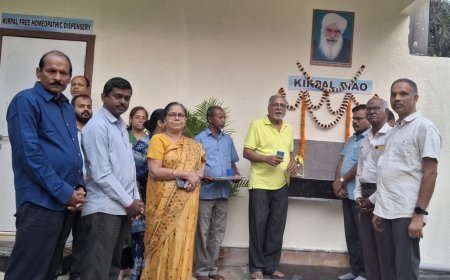The Urgency of Toilets in Indian Towns: A First-Hand Experience

By- Sanjay Pattnayak
India has made significant strides in infrastructure development, but there remains a stark and embarrassing reality that plagues many urban and rural areas alike: the lack of public toilets. This problem, which persists even in townships and cities, can lead to uncomfortable and sometimes undignified situations. My own experience at Jharsuguda Railway Station serves as a testament to the gravity of the issue.
Several years ago, after a long train journey, I arrived at Jharsuguda. The bus stand was about one and a half kilometers away, and I decided to walk. As I strolled through the town, a familiar and urgent need arose — the need to relieve myself. What should have been a simple and private matter quickly became a stressful ordeal, as I struggled to find a suitable and empty space to urinate.
As the pressure increased, so did my frustration. Despite walking through several streets, there was no public toilet in sight. Finally, I came across a secluded spot near a small hotel. A pile of waste and burnt coke debris had formed a makeshift hillock, and though the area was far from clean, my urgency left me no choice. Without much thought, I began to relieve myself.
Then, something caught my eye. Written on the wall next to where I stood were the words, " देखो कुत्ता पेशाब कर रहा हे" ("Look, a dog is urinating"). I paused, a bit amused, and then smiled at the creativity of the message. The humor didn’t escape me, but neither did the irony: rather than discouraging people, such signs are often found in places where people are left with no other choice but to defy the warnings. In the absence of public facilities, these spots become the default locations for relieving oneself, with witty or derogatory one-liners as the only barrier.
This experience, though humorous in hindsight, is a reminder of a much larger issue — the lack of proper sanitation facilities in India. The absence of public toilets forces people to resort to unsanitary and often unhygienic methods of relieving themselves. This not only affects personal dignity but also contributes to environmental pollution and health hazards.
The Swachh Bharat Mission launched by the Government of India has made substantial efforts to address the issue of sanitation across the country. However, the reality remains that in many places, particularly in smaller towns and rural areas, the availability of public toilets is still inadequate. The construction of more toilets under this mission is crucial for maintaining the cleanliness and hygiene of our public spaces.
In urban centers, the absence of public toilets often leads to embarrassing and degrading situations. People are left to find hidden corners, alleyways, or even public walls, despite the presence of warnings or signs. This not only harms the dignity of the individual but also perpetuates a culture of open urination and defecation, which is detrimental to both public health and the environment.
The need for public toilets cannot be overstated. Proper sanitation is a basic human right, essential for maintaining hygiene, privacy, and public health. The government, along with local authorities, must prioritize the construction and maintenance of toilets, especially in busy areas like railway stations, bus stops, and marketplaces. Public awareness campaigns should also be conducted to encourage the use of toilets and discourage open urination and defecation.
To conclude, my experience in Jharsuguda is just one of many that millions of Indians face every day. While initiatives like the Swachh Bharat Mission have brought much-needed attention to the issue, the problem persists, and much work remains to be done. The government’s responsibility is to provide clean, accessible, and well-maintained toilets for all. Only then can we hope to eliminate the practice of open urination and uphold the dignity and health of our people.











































